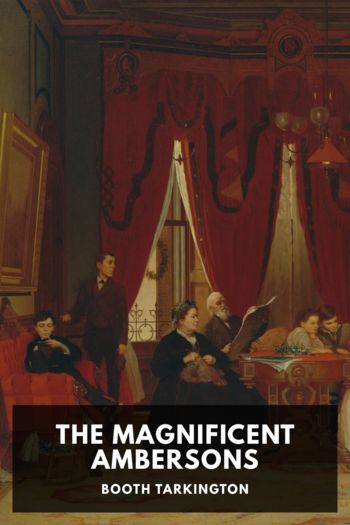The Magnificent Ambersons by Booth Tarkington (little red riding hood ebook .TXT) 📕

- Author: Booth Tarkington
Book online «The Magnificent Ambersons by Booth Tarkington (little red riding hood ebook .TXT) 📕». Author Booth Tarkington
The streets were thunderous; a vast energy heaved under the universal coating of dinginess. George walked through the begrimed crowds of hurrying strangers and saw no face that he remembered. Great numbers of the faces were even of a kind he did not remember ever to have seen; they were partly like the old type that his boyhood knew, and partly like types he knew abroad. He saw German eyes with American wrinkles at their corners; he saw Irish eyes and Neapolitan eyes, Roman eyes, Tuscan eyes, eyes of Lombardy, of Savoy, Hungarian eyes, Balkan eyes, Scandinavian eyes—all with a queer American look in them. He saw Jews who had been German Jews, Jews who had been Russian Jews, Jews who had been Polish Jews but were no longer German or Russian or Polish Jews. All the people were soiled by the smoke-mist through which they hurried, under the heavy sky that hung close upon the new skyscrapers; and nearly all seemed harried by something impending, though here and there a women with bundles would be laughing to a companion about some adventure of the department stores, or perhaps an escape from the charging traffic of the streets—and not infrequently a girl, or a free-and-easy young matron, found time to throw an encouraging look to George.
He took no note of these, and, leaving the crowded sidewalks, turned north into National Avenue, and presently reached the quieter but no less begrimed region of smaller shops and old-fashioned houses. Those latter had been the homes of his boyhood playmates; old friends of his grandfather had lived here;—in this alley he had fought with two boys at the same time, and whipped them; in that front yard he had been successfully teased into temporary insanity by a Sunday-school class of pinky little girls. On that sagging porch a laughing woman had fed him and other boys with doughnuts and gingerbread; yonder he saw the staggered relics of the iron picket fence he had made his white pony jump, on a dare, and in the shabby, stone-faced house behind the fence he had gone to children’s parties, and, when he was a little older he had danced there often, and fallen in love with Mary Sharon, and kissed her, apparently by force, under the stairs in the hall. The double front doors, of meaninglessly carved walnut, once so glossily varnished, had been painted smoke gray, but the smoke grime showed repulsively, even on the smoke gray; and over the doors a smoked sign proclaimed the place to be a “Stag Hotel.”
Other houses had become boardinghouses too genteel for signs, but many were franker, some offering “board by the day, week or meal,” and some, more laconic, contenting themselves with the label: “Rooms.” One, having torn out part of an old stone-trimmed bay window for purposes of commercial display, showed forth two suspended petticoats and a pair of oyster-coloured flannel trousers to prove the claims of its black-and-gilt sign: “French Cleaning and Dye House.” Its next neighbour also sported a remodelled front and permitted no doubt that its mission in life was to attend cosily upon death: “J. M. Rolsener. Caskets. The Funeral Home.” And beyond that, a plain old honest foursquare gray-painted brick house was flamboyantly decorated with a great gilt scroll on the railing of the old-fashioned veranda: “Mutual Benev’t Order Cavaliers and Dames of Purity.” This was the old Minafer house.
George passed it without perceptibly wincing; in fact, he held his head up, and except for his gravity of countenance and the prison pallor he had acquired by too constantly remaining indoors, there was little to warn an acquaintance that he was not precisely the same George Amberson Minafer known aforetime. He was still so magnificent, indeed, that there came to his ears a waft of comment from a passing automobile. This was a fearsome red car, glittering in brass, with half-a-dozen young people in it whose motorism had reached an extreme manifestation in dress. The ladies of this party were favourably affected at sight of the pedestrian upon the sidewalk, and, as the machine was moving slowly, and close to the curb, they had time to observe him in detail, which they did with a frankness not pleasing to the object of their attentions. “One sees so many nice-looking people one doesn’t know nowadays,” said the youngest of the young ladies. “This old town of ours is really getting enormous. I shouldn’t mind knowing who he is.”
“I don’t know,” the youth beside her said, loudly enough to be heard at a considerable distance. “I don’t know who he is, but from his looks I know who he thinks he is: he thinks he’s the Grand Duke Cuthbert!” There was a burst of tittering as the car gathered speed and rolled away, with the girl continuing to look back until her scandalized companions forced her to turn by pulling her hood over her face. She made an impression upon George, so deep a one, in fact, that he unconsciously put his emotion into a muttered word:
“Riffraff!”
This was the last “walk home” he was ever to take by the route he was now following: up National Avenue to Amberson Addition and the two big old houses at the foot of Amberson Boulevard; for tonight would be the last night that he and Fanny were to spend in the house which the Major had forgotten to deed to Isabel. Tomorrow they were to “move out,” and George was to begin his work in Bronson’s office. He had not come to this collapse without a fierce struggle—but the struggle was inward, and the rolling world was not agitated by it, and rolled calmly on. For of all the “ideals of life” which





Comments (0)